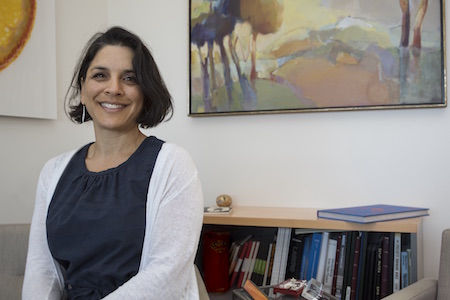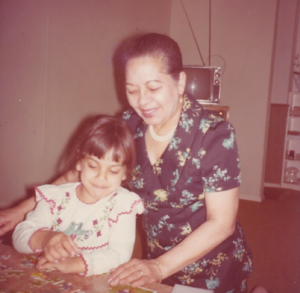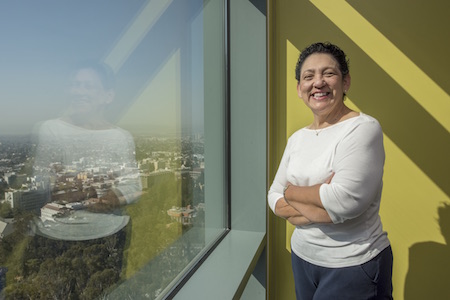National Hispanic Heritage Month is observed each year from Sept. 15 to Oct. 15. Today, 55 million people or 17 percent of the American population are of Hispanic or Latino origin. This represents a significant increase from 2000, which registered the Hispanic population at 35.3 million or 13 percent of the total U.S. population. We profile Deirdre Olynick of the Molecular Foundry, Carlos Lopez of IT, and Zaida McCunney of NERSC.
Deirdre Olynick, Staff Scientist, Molecular Foundry

(Photos by Marilyn Chung/Berkeley Lab)
When Deirdre Olynick looks back on her family’s immigration story, assimilation is what comes to mind most prominently. It was key to her Venezuelan grandmother’s success in a new country at the age of 16 and to her Venezuelan/Cuban father’s success in his career.
“There was a very clear recognition that assimilation was vital,” says Olynick. “So when people couldn’t pronounce my grandmother’s name correctly, she just decided to change it to the more ‘American’ version.”
For many years, Olynick knew her grandmother as Helen, only later learning that her name was actually Elena. Teenage Elena had come to New York City from Venezuela with her godmother in the 1930s because her mother couldn’t afford to care for her anymore. She married a young Cuban man she met in New York, then divorced when Olynick’s father was five; she later remarried, taking the surname Olynick (Olynick’s grandfather’s last name was Ramos).
“My father worked hard on his education when my brother and I were young and then struggled to gain a foothold in the software industry,” she says. “He was successful and rose to become the vice president of a software company, but to do so, unfortunately at that time he felt he had to assimilate and leave a lot of his culture behind.”
In keeping with the strong drive to assimilate, Olynick’s grandmother stopped speaking to her son in Spanish when he entered kindergarten, and never spoke the language with Olynick. “She did instill her culture with me in other ways though,” says Olynick. “She made traditional Venezuelan food for me, like hallacas and black beans and rice, and she taught me to make them as well.”

Deirdre Olynick with her grandmother
Olynick’s father met her mother in high school, and his dark skin was not pleasing to her mother’s Jewish parents. “My [maternal] grandmother would sit in the back of my mom’s high school classroom to make sure that she and my dad weren’t seeing each other at school,” Olynick says. “And then after they did get pregnant and marry, my [maternal] grandfather wouldn’t speak to my mother for more than a year after my older brother was born.”
Her maternal family history is one of survival as well; some of her Jewish ancestors didn’t survive the Holocaust, and her Eastern European grandparents struggled to make it as first generation Americans. “Growing up with immigrant families on both sides really taught me that you have to strive to make your way,” she says. “From the Jewish side, it was education that was so deeply ingrained, and my Latino dad also recognized the importance of this, so it was instilled in me from a very young age.”
Olynick felt like an immigrant herself for much of her childhood, especially after her parents divorced and she moved to North Carolina with her family. In her neighborhood and in high school, she was one of just a few people of color. “When I tried to explain my background to people, it was hard for them to understand because there just simply weren’t pictures or examples of diversity in our town,” she recalls. “There was teasing; there were misconceptions; I remember kids telling me I was African-American, just because they thought anyone with a skin tone other than white must be. Although North Carolina is considered the South, I never experienced discrimination from my teachers, and I liked school.”
She took her education seriously, finding a passion for chemistry in high school and taking that to college, where she discovered materials science and went on to get her PhD.
When Olynick went back to visit her dad in New York, she felt like she was in a different world compared to North Carolina. “I identify with what it’s like to be different and have multiple homes,” she says. “I feel like my Hispanic heritage is very important, and my mixed background is as well because I have that richness of culture from both sides.”
Even though New York was vastly more diverse than where Olynick spent most of her childhood, it wasn’t enough to save her father’s life when he needed a bone marrow transplant after surviving Hodgkin’s disease at a young age. “He didn’t have any siblings, and the bone marrow database was so limited for people of Hispanic heritage,” she says. “If it had been more diverse, he might have had a chance of survival.”
As an adult, Olynick says she consciously chose to live in a diverse area. Olynick pays homage to her roots these days by sharing with her family memories of her grandmother and father and cooking her grandmother’s Venezuelan recipes. She has stacks of her grandmother’s letters that she’s working on translating from Spanish. Olynick named her daughter Elena, and she’s proud to teach people how to pronounce it.
Carlos Lopez, Help Desk/AV Support Staff, Information Technology Division
 When the civil war raging in El Salvador became unbearable, Carlos Lopez’s parents made the difficult decision to flee to the U.S. with their two young children. His parents both had work visas, but they couldn’t get visas for their children. So they traveled to the Mexican border and walked through strawberry fields, waded across a river, and ran across a freeway to a new and safer life.
When the civil war raging in El Salvador became unbearable, Carlos Lopez’s parents made the difficult decision to flee to the U.S. with their two young children. His parents both had work visas, but they couldn’t get visas for their children. So they traveled to the Mexican border and walked through strawberry fields, waded across a river, and ran across a freeway to a new and safer life.
The family made it to Los Angeles, where one of Lopez’s uncles lived, and settled there for a few years. Lopez started first grade at a new school, his mom worked as a nanny, and his dad took a job as a furniture maker. In El Salvador Lopez’s father had been a successful salesman for a company that sold civil engineering components. He was the main liaison with American suppliers, so he spoke English fluently but didn’t have much experience reading or writing English. Lopez’s mom also knew English and could read and write it well but wasn’t as comfortable speaking. “So they complemented one another well,” Lopez says.
As for Lopez, he credits a wonderful retired teacher at his first American school for his command of the English language. “This lady volunteered at my school to pull the kids who were new to the country and learning English, and she spent hundreds of hours working with us,” he recalls. “One of my fondest memories of that time is how she would reward us for reading well with turns on a little trampoline, and she’d give us chocolate chip cookies—I’d never seen either of those things before!”
He adds: “To this day, people compliment me on my writing and pronunciation, and I really credit her with giving me that early and solid start.”
The family moved around a lot during Lopez’s early childhood before settling down in Antioch for Lopez’s junior high and high school years. His mom started her own housecleaning business, which she still runs. His dad became a janitor for a large San Francisco building complex, a position he held for 30 years. On the side, he started his own tax consulting business, focusing on serving the Latino community.
Lopez got his start in computer support by helping his dad with his business. “He relied on me to read the manuals that came with all his tax software and figure out how to install the IRS programs and print out the forms correctly,” he says.
Though he studied health sciences and communications in college, computers were always his passion, so he’s not surprised that’s what he ended up choosing for his career path. He now works on the IT help desk at the Lab.
His parents modeled a strong work ethic; as a result Lopez says he has never been afraid to take on just about any job. “Both my parents worked nonstop,” he says. “I did watch them struggle at times and wanted to pitch in and work to help, but their message to me was always to focus on my education and strive to do a bit better than them financially.”
Lopez has two teenage sons and both of them speak Spanish, mostly because that’s the only language his parents speak with them. His older son has gained a lot of confidence in his Spanish skills through trips to numerous South American countries. Both of them have been back to El Salvador with Lopez, who has travelled back many times over the years.
“When I go back to El Salvador to see my relatives, it really pulls at my heart because it’s so difficult there,” he says. “Recently, San Salvador was rated the third most dangerous city in the world; it’s still not a safe place and I wish we could have convinced them to emigrate as well.”
Zaida McCunney, Administrative Supervisor, National Energy Research Scientific Computing Center (NERSC)

When Zaida McCunney came home from her first day of school in the United States, she told her parents that she couldn’t understand anything her teachers said. McCunney’s family had recently arrived from El Salvador, and she and her five siblings didn’t speak any English. “I remember my parents saying to me, ‘It will be easier tomorrow,’” she recalls. “And it was.”
That sentiment was indicative of what got McCunney’s parents through their new lives in America, working exhausting factory jobs to support their six children. “My parents worked so hard, but I never heard them complain,” she says.
Her father had been a semi-professional baseball player in El Salvador, and her mom had a good job in a bank. But the poverty and strife in El Salvador was enough for them to decide to leave it all behind and come to the U.S. in pursuit of “the American dream.”
Her father left first, arriving in 1958, sponsored by his brother who was living in San Francisco. Two years later, her mother and all six kids were given permission to immigrate. In San Francisco, her dad took a job as a machinist and her mom as a laundry factory worker.
“When you come to a new country and you need to support your family, you take whatever jobs are available to you,” McCunney says. “And unfortunately, many of those jobs are the jobs that most people don’t want.”
McCunney, who’s been at Berkeley Lab since 1998 and is now an administrative supervisor at NERSC, took a few of those types of jobs as she worked her way through college, including cleaning houses and working at a cannery. Her parents had always encouraged her to pursue education, and with the help of a wonderful high school counselor, McCunney got a scholarship to San Jose State and earned her degree in administration of justice and law enforcement.
“My first job after college was working in the Santa Clara County juvenile probation department,” says McCunney. “And I had the great honor of working with Judge Leon Panetta, who was always so supportive and encouraged me to pursue my dreams.”
Being bilingual turned out to be a major asset in her career—she was an interpreter for Spanish-speaking families in the Santa Clara court system, and later she helped translate safety brochures at a large insurance company, which helped decrease accidents on construction sites where most of the workers were native Spanish speakers.
“I’m so glad that my parents insisted that we maintain our fluency in Spanish,” she says. “But by the same token, I’ve seen the discrimination that comes with not being fluent in English—how differently store employees treat me when I’m with my parents and I speak up without an accent.”
McCunney and her siblings were always surrounded by El Salvadoran culture—her family cooked traditional foods from El Salvador, decorated the house with special objects from their home country, and cherished their faith and took their kids to church regularly. “Family was everything, so there were lots of family outings and big family get-togethers,” she says. “And there still are.”
Nowadays, her siblings and her parents all live in the Bay Area, and family get-togethers always include pupusas, tamales, and other El Salvadoran food. She loves to see her husband, who is of Irish/German/Dutch descent, and her son enjoying food from her home country. “One of our family traditions is to make tamales at Christmas time,” she says. “It takes about three days to go through the whole process, so when we make them, we make hundreds.”
When McCunney turned 18, her parents encouraged her to become a citizen. “I was so proud,” she says. “One of the first things I did was to register to vote, because I really believe it’s important to have a voice in bettering our country and providing for people.”
– Keri Troutman

great stories.
Thank you for sharing your stories!